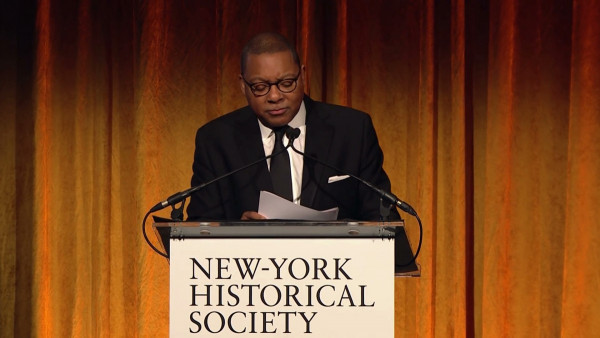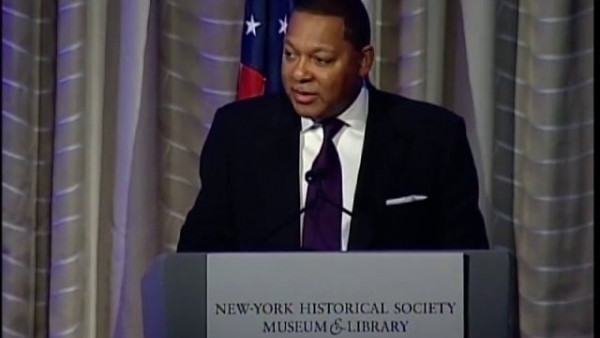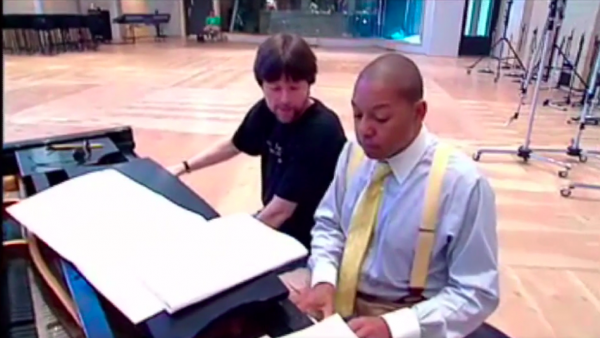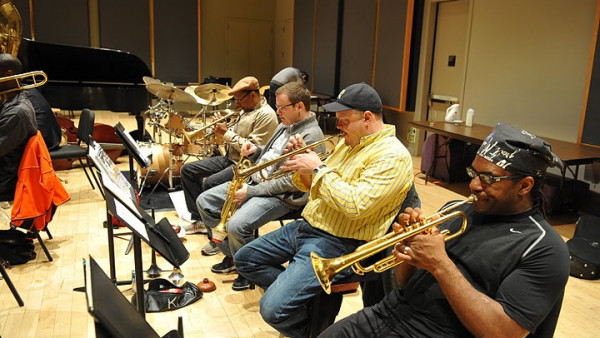Tribute to Ken Burns by Wynton Marsalis
September 26, 2016
2016 History Makers Award
The New-York Historical Society
Monk, in answering the question “What’s happening Thelonious?” replied, “Everything is happening all the time, man.” Funny, but true. In our country alone, we swim a brimming sea of over 320 million people and roughly 200 billion points of view per second, but in the bowels of this cacophony there is startling commonality in our individuality. We are all simply “the kid from Omaha,” or “Red Bank,” or “Anchorage,” or “Seattle.” We all sat in the same classrooms and paid attention, or didn’t pay attention, played the same games or felt left out; we were wealthy or broke or everything in between, and, regardless, we all wrestled with some kind of familial dysfunction, and all of us dreamed beyond the limited scope of what was agreed to be “reality.” Slowly and sadly, our boldest dreams easily become ground to dust, by the repetition of days become weeks, become decades, becomes centuries. And life becomes protocol. Before you know it, you are living a mundane set of rituals and daily touchstones that you could virtually sleepwalk through without actually experiencing. And because we only understand a present moment as it fades to memory, history could also mean “understanding.”
Old folks in the country used to say, “If you have a long memory, you have a long life.” And history is our memory and, as such, it is the province of artists as storytellers. Those artists recreate the stories that tell us what things mean and have meant, and if those stories are insightful and intense enough, they are also accurate in telling us what things will mean.
You know, it’s always much easier to do less of something that is difficult to do. Where there is struggle, there is circumvention, if not flat out avoidance. That’s why it is easier to memorize dry facts of our history instead of engaging with the human meaning of it. Beyond the mask of coldly recited dates and names lies the rich vein of interactions that defines the best and worst of us as a people. These subjective human facts are easily forgotten or omitted as we reshape the story of ourselves with repetitive slogans. “George Washington could not tell a lie “ is far less interesting than the lies he actually told. The fact of chattel slavery as a blue chip on the New York Stock Exchange is more interesting than the simple demonizing of plantation owners.
The most heroic aspect of historic storytelling entails leading a people to embrace aspects of their personality that they would rather forget or alter. In that forgetting, and in the repetition of what has been altered, the lies upon lies create a virtual foundation which becomes more and more shaky as the pressures of time and the unnegotiable truth of circumstances force us to live up and not down to our heritage.
The enlightened historian and storyteller sifts through hopes and aspirations of people and focuses the light on this, that, or the other, to establish, reorder and repurpose their mythology. No film, no story, no work of art can tell the ALL of anything, let alone everything. It picks and chooses those most resonant gems that are representative anecdotes for so much more. So when Monk said, “Everything is happening all the time,” he was giving tonight’s honoree an answer to his most frequently asked question, “Why did you leave out this or that?” A person is not known for what they don’t do. And although many would want to control how our past is defined, so few are qualified, many less are accepted, and almost no one is celebrated for their mastery in telling the tale. When it comes to the depth and sustained intensity of the public’s love for his vision of our history, tonight’s honoree occupies a singular position.
Awards are strange things because the honoree must sit in embarrassed pride and listen to his accomplishments. He is required to feign humility and act with an “Aw, shucks” awkwardness when saluted. And the higher the salutation, the lower the awardee must sink under the table. Well, tonight I want you to enjoy what I have the pleasure of saying in representing what we at the New York Historical Society know to be true. We honor you because we respect your values, your achievements and your art, and we want them to be known and replicated by our future generations. We recognize that your work realizes the dreams of our ancestors and raises the horizon of aspiration in our youth. For that we thank and salute you.
Your powers of concentration, imagination and dedication are legendary. Italian painter Giotto created perspective, and Spaniard Picasso showed us all of the dimensions of a face in someone’s nose. Well….somebody born in Brooklyn showed us how to perceive new and different dimensions of our history, how to channel the 20 billion democratic perspectives on a fundamental and known subject into an informative and cohesive statement, how to show the good and bad of any position in one frame, all WHILE leading you to conclude something good about it.
You brought the oftentimes-accurate views of the disenfranchised out of the shadowy background into the foreground. You have taught us how to weave the human constant into our history and perceive it not as facts of presidents and wars and edicts, but as human interactions and human responses and human consequences that don’t so much change over time as play out on the field of time.
You invented a new way of presenting history by mining the rich vein of universal fundamentals that don’t change: loneliness and camaraderie, triumph and heartbreak, familial dysfunction and familial nurturing, physical frailty and strength, hubris and heroism, intelligence and stupidity, greed and generosity, jealousy and love, all woven into a seamless tapestry of now. You are a master of timing and of knowing the sweet spot of a story, of how to ask questions to get to the basic human feeling and to draw out the true spirit of a given subject from a reluctant subject. You are master of the long form in the time of shortening attention spans. Your films regularly dominate multiple nights of weeks with events that change our perception of the lives we live, while conceding nothing to the garish, the foolish, or the spectacle that passes for entertainment.
As will be evidenced by tonight’s debate, it’s a known fact that things are falling in our country. Tests scores fall, employment opportunities fall, work ethic falls, and manners fall. The only things rising are crime, the global temperature and time wasted on mobile devices. But somehow, with your charisma, drive and obsessive genius, you have managed to win the long uphill battle against apathy to plant the flag of our highest hopes on the highest ground. Though you are famous for being exacting about your films, you actually are easy to work with because you have one instruction, “Keep doing it until it’s right and if it’s not right, let’s do it again.”
And when we look at you tonight, we see a man who is over 60 years of age sitting up here looking like a boy in the first bloom of youth, excited about “our coming film on Vietnam”, a man who is full of fire about our national elections. You have found the secret of youthfulness, it’s in your indefatigable appetite for work and your joyous optimism that springs from an indestructible belief that the work you are doing changes lives and is elevating the landscape of our country’s knowing of itself. Don’t let that boyish face fool you. This is a man of steely resolve whose unblinking gaze is trained on the betterment of our world. Because you work like every day is your last, because you understand that what’s at stake is life itself, the intensity of the light you have lit will illuminate a clear path for generations to come.
As Americans, our strongest art results from the democratic working of teams. We work best by consensus and reasoned compromise. No film is the work of one man. Of course, the more people, the more dysfunction. Working with folks is an art in itself. One that the quality and longevity of your teams demonstrate you have mastered. With great producer and sometimes co-director Lynn Novick, writer and producer Dayton Duncan, editors Paul Barnes, Tricia Reidy and Erik Ewers, and countless others, you have set an unwavering high bar for quality in all aspects of filmmaking.
I wish to conclude with some words from a man who has been in so many ways your principal collaborator, the soulful historian Geoffrey Ward. For 34 years you have worked together so closely to answer the questions, “Who are we as Americans?” and “What can our country become? “
Geoff says, “After all of this time, I love and am inspired by what we do. From the first, he has understood that we’re all in this together. Black history is white history is American history. No one owns our past. Everyone has a stake in it. He has also always understood that the men and women whose stories we tell were in every sense just like us— bold and devious, brave and fearful, enlightened and ignorant, defeated and victorious.
“That fact should reassure, not intimidate us, because to know them and what they did is to begin to know ourselves and see what we might do.
“And best of all, in cynical times, he deeply believes and has proven again and again, that there are millions of people out here who want to know who we have been so that we can improve who we are.”
You have given us a much cleaner and reliable memory, and with so many crucial decisions bombarding us at the speed of light, that is as good as giving us life itself. The shame is, your work will impact generations and you will never see the uplift and effect of it on the future of our nation and our planet.
We at the New-York Historical Society are honored to give the 2016 History Makers Award to a man of distinction, integrity and courage, Mr. Ken Burns.





